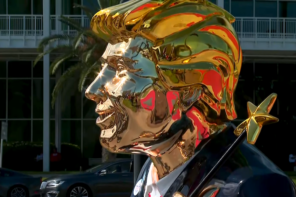Donald Trump has a way of turning things topsy-turvy, and the religious world is certainly not exempt.
The Southern Baptist Convention (or some of its leaders, anyway) have joined the Never Trump movement:
[Russell] Moore effectively announced his new mission in September, when he published a searing op-ed in the New York Times in which he compared Trump to a “Bronze Age warlord” and concluded that evangelicals embracing him were promoting the idea that “image and celebrity and money and power and social Darwinist ‘winning’ trump the conservation of moral principles and a just society.”
Moore, of the SBC’s Ethics and Religious Liberty Commission, has been tearing it up on Twitter, op-eds, and any other venue he can find to denounce Trump as a menace to “the gospel.” So have other leaders such as Andrew Walker, ERLC’s policy director, and Albert Mohler, president of Southern Baptist Theological Seminary (and himself a respected evangelical theologian).
Politics making strange bedfellows as they do, these conservative leaders have been joined by more liberal voices, such as David Gushee of Mercer University:
On April 28 I joined a multi-racial group of Christian ministers and scholars in releasing a statement confessing resistance to Donald Trump as a Christian obligation. Indeed, I helped draft the statement, signed by dozens of leaders such as Jim Wallis, Otis Moss III, Shane Claiborne, and Lisa Sharon Harper.
As Ruth Graham points out, these moves aren’t universally popular in the evangelical world. For all his many faults, Trump is still closer to the conservative perspective of many evangelicals than Hillary Clinton is. And that might be exactly the reason Moore and Mohler are going after Trump so hard: they don’t want their own conservative vision stained with Trump’s noxious racism, xenophobia, and uncoded misogyny.
As for Gushee and his coalition, well, liberals gonna liberal.
It’s hard to fault the efforts of these evangelical leaders to stop Trump. They’re doing what they can to help the nation avoid a disastrous political outcome that most definitely doesn’t line up with their morals. (I’ve given Mohler, Moore and even Gushee a lot of shit over the years for poor sexual politics, but I’ve never known any of them to be outright racists or warmongers.) Their stands might be prophetic, but in the end they’re probably not going to accomplish very much.
For one thing, nobody listens to religious leaders anymore. American politics has become so factionalized that not even the tribes’ priests can call them back.
For another thing, the kind of people who “confess resistance” to a charlatan like Trump were never going to vote for him in the first place. Which is another way of saying that the evangelical leaders really are preaching to the choir: Trump does best with occasional churchgoers, who “have lower incomes and education levels than those who show up on Sunday morning,” according to Ruth Graham. Literally, the people who listen to Russell Moore or David Gushee listen to them. The ones that don’t aren’t in the pews very much, if at all.
For a third thing, the evangelical vote seems to be taking care of itself:
The Battleground Poll has the Clinton-Trump God gap at under 15 points, with those who say they go to church at least once a week preferring Trump to Clinton by nine points and those attending less frequently preferring Clinton to Trump by less than six. That compares to a God gap in 2012 of nearly 40 points.
Emphasis mine: Trump has reduced the GOP lead among religious voters by 25 percentage points in just four years, a shift that’s only rivaled by that of Hispanic voters. A lot of that comes from the changing views of evangelicals, who went 79% for Mitt Romney, but who split between Trump and Clinton 47-47. That’s yooge, to imitate a certain candidate with orange skin and massive hair.
As Mark Silk points out, this means that the gap between religious voters is less important this cycle than the one between men and women. Perhaps these evangelical leaders ought to start with their fellow men? Anyway, the gap among religious voters is also less important than the one with non-religious citizens:
Then there’s the decline in support for the Democratic presidential candidate on the part of the Nones. They voted for Obama over Romney 70 percent to 26 percent but support Clinton over Trump by just 59 percent to 28 percent. Did I mention that Nones are disproportionately male?
I wouldn’t read too much into this. A good bit of that drop is no doubt Nones’ preference for Bernie Sanders, just as many evangelicals would rather have Ted Cruz than Trump. Most of them will come back to the eventual nominee, on both sides. Even if they didn’t, 59-28 is a shellacking. The GOP can’t win with those numbers.
In sum, conservative evangelicals are divided among themselves, even as their formerly solid vote loses its relevance. Trump turns the political world upside down by making the non-religious vote more important than the gospel-mongers’. And as a pastor in a mostly—but not entirely!—liberal denomination, I have to confess a certain amount of schadenfreude in watching the SBC have a wedge driven straight down its middle.
After years of mainline protestants tearing themselves apart over issues like same-sex marriage and reproductive rights, it’s nice to see the shoe on the other foot for a while. I do believe I will sip some tea while eating this popcorn. Donald Trump has turned the usually solid-Republican evangelical coalition topsy-turvy, and the view from upside-down couldn’t be more fun.




